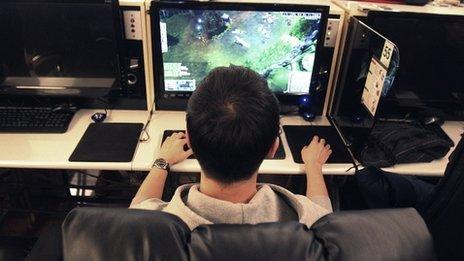Violent video games leave teens 'morally immature'
- Published

More than half of teenagers in the study played a computer game every day
Playing violent video games for long periods of time can hold back the "moral maturity" of teenagers, according to a study in Canada.
In-depth research into the behaviour of about 100 13- and 14-year-olds found over-exposure to violent games weakened empathy for others.
More than half were found to play video games every single day, with violent games the most common.
Researchers warned of adolescents losing a sense of "right and wrong".
Brock University academics studied the behaviour of pupils at seven schools in Ontario, trying to understand the relationship between the type of video games played, the length of time spent playing and how it might affect their attitudes.
Lack of empathy
The study found that playing video games was highly prevalent among this age group, usually between one and three hours a day - and playing violent games was very common.
"Violent" games were defined as those where players acted out the killing, maiming, decapitating or mutilating of other human characters.
Such was the widespread nature of violent video games that researcher Mirjana Bajovic said it might be unrealistic for parents to try to prevent their teenage children from seeing them.
Many teenagers could play these games without any evidence of a change in attitude. And non-violent games seemed to have no adverse effects on "moral reasoning", regardless of time spent.
But the problems arose with teenagers who spent more than three hours every day in front of a screen, continuously playing these violent games without any other real-life interaction.
'Right and wrong'
Empathy, trust and concern for others, which should develop as teenagers grow up, were found to be delayed.
It was the combination of the content of games and the amount of time that seemed to affect teenagers' attitudes.
The study said: "Spending too much time within the virtual world of violence may prevent [gamers] from getting involved in different positive social experiences in real life, and in developing a positive sense of what is right and wrong."
For these screen-obsessed teenagers, the researchers say that parents should try to put them in social situations where they have to see other people's perspectives or needs, such as charity work.
- Published10 May 2012
- Published31 January 2013
- Published30 May 2013
- Published28 February 2013
- Published15 May 2012